The INTP Cognitive Function Stack
Have you ever heard the term “cognitive function” and wondered what it meant? When it comes to personality type, each of us have a “cognitive function stack.” This stack tells us which mental processes we prioritize, which we prefer, and which come more naturally to us. Your Myers-Briggs® personality type ultimately gives you a way of understanding how your brain works and why you see and interpret situations the way that you do. If you want to know what your INTP cognitive functions are doing in the background of your mind, this article is where you’ll want to begin. By knowing more about how your mind really works, you can have more self-understanding and self-awareness. You can also have more understanding of the diverse people that walk in and out of your daily life.
So this INTP cognitive function stack. What is it going to tell us? This “stack” tells us how INTPs process information and make decisions. Each cognitive function in the stack has a special name and a shortcode. For example, the dominant function of the INTP is Introverted Thinking, but if we were to type that out every time we reference it, the whole post might get really wordy. So people in the personality type community use the abbreviation “Ti” to describe Introverted Thinking. The function itself is capitalized (T for Thinking) but the direction of the function is lower-case (i for introverted).

Table of contents
- Why Are Functions Introverted or Extroverted?
- INTP Primary Cognitive Function Stack (Most Valued Functions):
- INTP Shadow Function Stack (Less Valued/More Unconscious):
- Dominant Function: Introverted Thinking (Ti)
- Auxiliary Function: Extroverted Intuition (Ne)
- Tertiary Function: Introverted Sensing (Si)
- Inferior Function: Extroverted Feeling (Fe)
- The INTPs Shadow Functions
- Opposing Role Function: Extroverted Thinking (Te)
- Critical Parent Function: Introverted Intuition (Ni)
- Trickster Function: Extroverted Sensing (Se)
- Daemon Function: Introverted Feeling (Fi)
- What Are Your Thoughts?
- Other Articles You Might Enjoy:
- Resources:
- About the Author:
Estimated reading time: 21 minutes
Why Are Functions Introverted or Extroverted?
If a function is introverted, that means that is directed inwards and less obvious to the outer eye. The process of using this function is often deep, intensive, and solitary, but it still runs in the background of our mind in social situations.
If a function is extroverted, that means that it is directed outwards towards the environment and people. It is more obvious to the outer eye and often amps up through interchange, discussion, or activity and external experimentation.
One of the amazing things about the cognitive functions is that they show us that we’re all ambiverts to some degree! All introverts have extroverted mental processes, and all extroverts have introverted mental processes. In the case of the INTP, they introvert thinking and sensing while extraverting feeling and intuition. You’ll see how this all works as you read the article!
INTP Primary Cognitive Function Stack (Most Valued Functions):
Dominant Function: Introverted Thinking (Ti)
Auxiliary Function: Extroverted Intuition (Ne)
Tertiary Function: Introverted Sensing (Si)
Inferior Function: Extroverted Feeling (Fe)
INTP Shadow Function Stack (Less Valued/More Unconscious):
Opposing Role Function: Extroverted Thinking (Te)
Critical Parent Function: Introverted Intuition (Ni)
Trickster Function: Extroverted Sensing (Se)
Daemon Function: Introverted Feeling (Fi)
Dominant Function: Introverted Thinking (Ti)
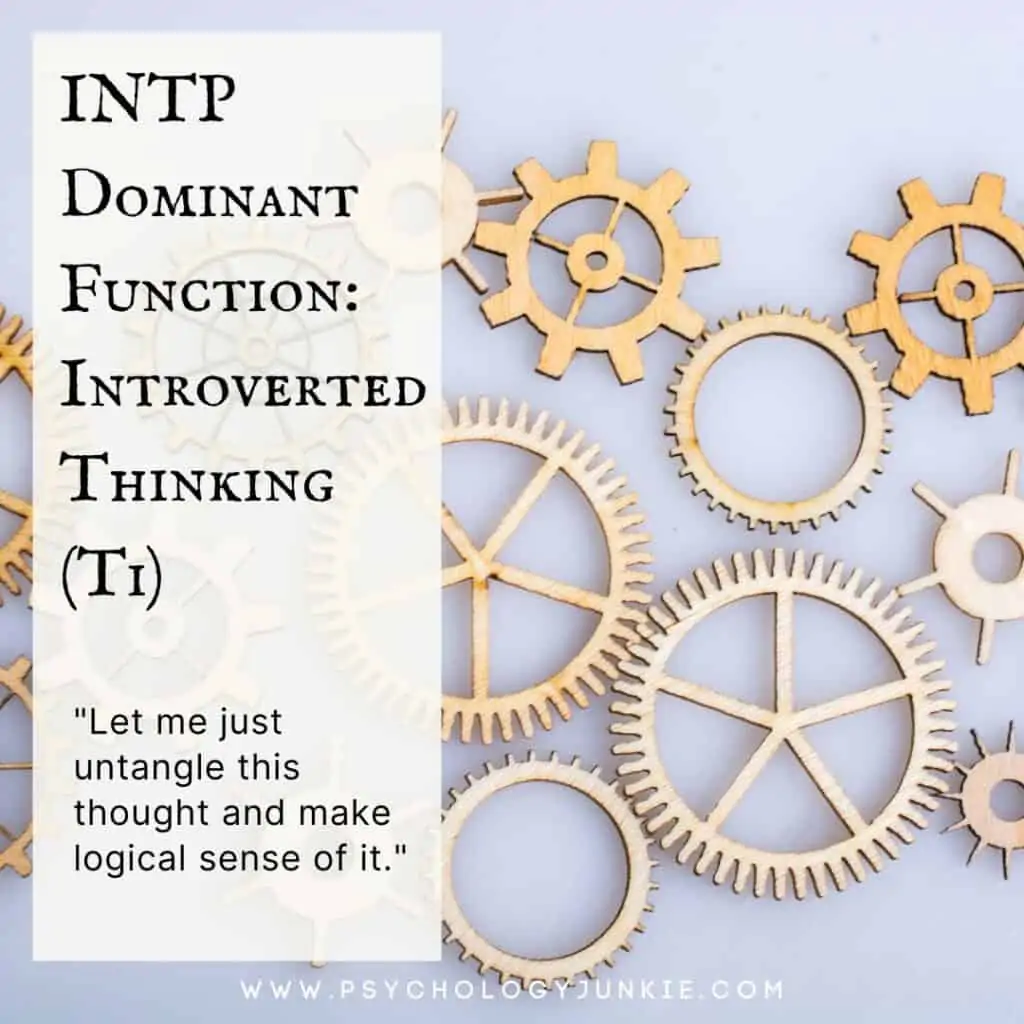
As a Dominant Function, Introverted Thinking (Ti) gives INTPs the ability to perform critical, detached analysis that sifts materials (ideas, things, concepts, ect) from general disorder into logical coherence. INTPs formulate insight as they untangle the wound threads of compelling questions that motivate them to ponder. From the Ti untangling comes principles which look something like “rules” they establish for how the world works and why. INTPs care greatly that things ultimately “make sense” to their own sense of how the pieces of the puzzle fit together. These Ti evaluations are based on subjective logic, which takes into consideration nuance and qualifiers. INTPs do not typically make blanket statements like, “things always work this way.” Every problem is its own, worthy of ample consideration.
INTPs utilize Ti in a number of ways, though they seem most apt to use Ti to peel apart thoughts and concepts. Typically, the INTP applies their one-track mind focus on something that brings them wonder and allows them to ruminate and focus on various angles of a problem for a substantial period of time. While facts, ideas, and other considerations might ignite a question worthy of pursuit within the INTP, the catalyst in itself is not what the INTP necessarily focuses on.
What “matters” to Ti is not typically what is said, but what is underlying what is said. If ideas are plants, Ti gets at the root of the plant. Unpacking what is meant by root may prove beneficial in order to showcase what Ti can accomplish.
Let’s say I ask a philosophical question that is open-ended. Something along the lines of “why are we here?” An INTP would take that one question and push the thought in a few different directions, focusing always on distilling it to its root as they see through and below the question. A few examples in response to the question why are we here? might be:
- Who is asking this question? And for what ends? Are they looking to solve an unsolvable problem?
- Does there need to be a why? If we could be anywhere, why not here?
- Define here. Are we taking this to mean here in this moment? Here in this city? Here on this planet?
- We as in us? We as in humans? We as in all of nature?
Ti isn’t initially answering the question so much as breaking the question down into components parts in order to better answer the real question once it is spliced to its rawest materials. Once terms are defined, limits are imposed, and intent is revealed, some semblance of an answer will come out of the INTP. It’s telling, however, that Ti naturally moves to question the question rather than answering it. INTPs are often labeled “The Philosophers” because their Ti is apt to take even the simplest statements and to push against them to ultimately find the truth. The truth, after all, is what INTPs are constantly seeking.
Auxiliary Function: Extroverted Intuition (Ne)
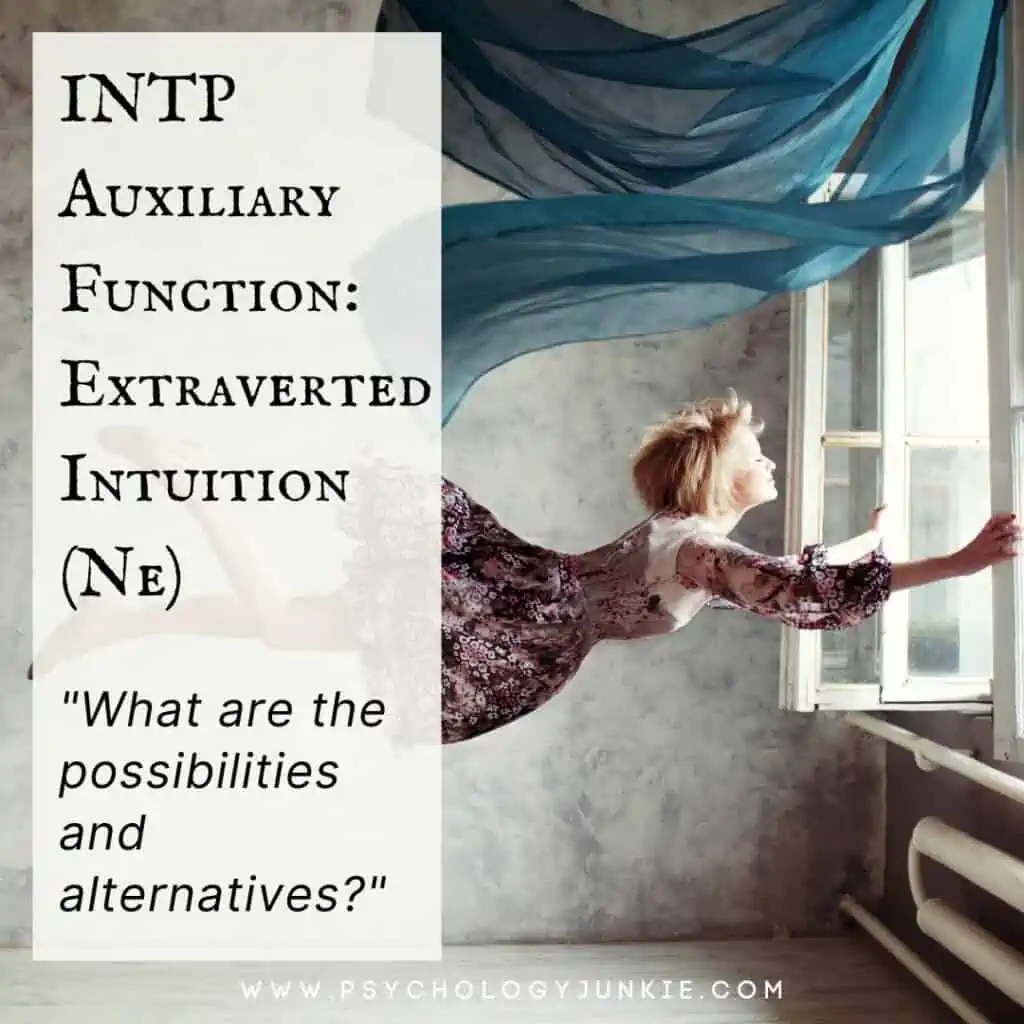
As an Auxiliary Function, Extroverted Intuition (Ne) gives INTPs the ability to expand the boundaries around what is known in order to better inform their Dominant Introverted Thinking (Ti). It’s important to note that every cognitive function in the function stack ultimately supports the Dominant Function. Ne expands the horizons of what the INTP’s Ti can break down by gathering new information. The larger the information field Ne creates, the more Ti can splice material apart, and the closer the INTP gets to the “ultimate” truth.
Ne wants to expand thought in several different directions. It’s an information-seeking function that looks for new feeding grounds wherever possible. While ISTPs with Extroverted Sensing (Se) typically seek more and more external experiences based in reality in order to build up their Ti worldview, INTPs with Ne seek more and more ideas and possibilities to build their worldview. It doesn’t matter where these ideas come from—friends, books, the internet, singular moments within experiences that stand out—so long as their knowledge hunger is fed. Many INTPs find themselves with upwards of 10 tabs open on their computer at any one time. It’s no wonder why given that their minds have a vicious curiosity built into their system that never turns off. What one person might call “rabbit holes” an INTP might call “essential learning material.”
INTPs utilize Ne for brainstorming and linking together seemingly random ideas in creative ways. They do not try to make creative connections between diverse topics, they just do. Frank Herbert, writer of the Dune series, is a fair example of an INTP. Within Dune, Herbert weaves together threads focused on eugenics, religion, philosophy, politics, war, relationships, family, witchcraft, technology, education, parenthood, and more, all the while keeping a central story line that proves easy to follow. Several of the topics—like eugenics and witchcraft—might not seem like topics that go together at first glance, but Herbert finds a way to connect the pieces in a fluid way that does “make sense” through the plot. Herbert’s ability to take such a wide range of topics and put them into a clear narrative is a great example of how an INTP naturally processes and makes sense of a mass amount of Ne information with Ti.
Tertiary Function: Introverted Sensing (Si)
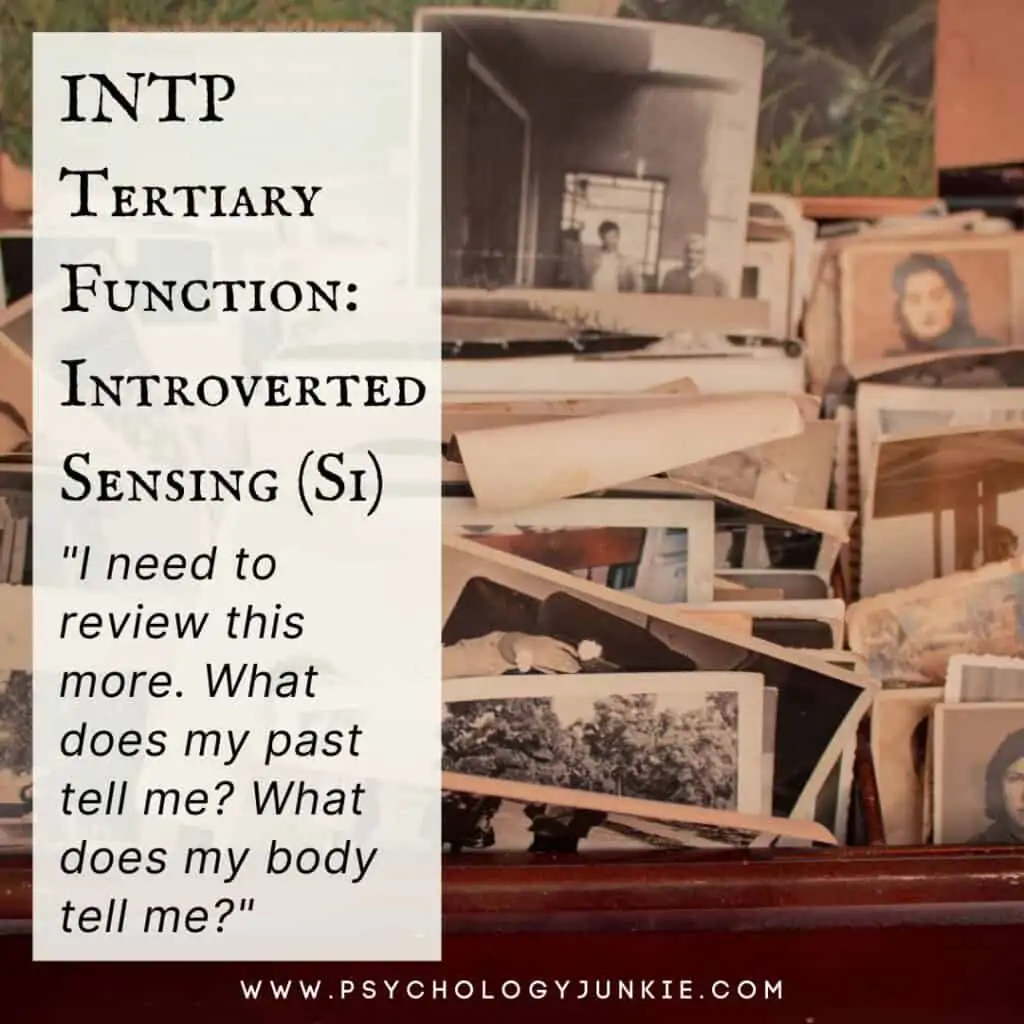
As a Tertiary Function, Introverted Sensing (Si) gives the INTP the ability to stabilize themselves, pay attention to their body, and create a sense of homeostasis. This in turn, helps them to meet their own external obligations. Again, as with all the functions, this ultimately serves Introverted Thinking (Ti) by giving the INTP a deep inner focus. If an INTP’s sensory needs are adequately met, it’s easy for them to hone in on the Ti simulations they are running in their minds. Meeting Si bodily needs and keeping general maintenance over deadlines helps INTPs to function “normally.”
Si alerts INTPs to their inner body rhythms. Their sensory awareness is not necessarily strong, but INTPs are typically decent at keeping themselves fed, registering when they need sleep, and so on. They may not choose to follow their bodily needs or may choose to do the bare minimum for upkeep as this area isn’t as sophisticated as their will towards knowledge intake is, but the awareness for its use is there. INTPs don’t mind when others cook, clean, or gently remind them about things in the external environment that have yet to be accomplished, although INTPs can become annoyed if pressured to manage these external tasks.
Unlike ENTPs, INTPs are typically aware of important deadlines, can keep track of bills, and so on. Given their introversion, INTPs are highly aware of the demanding external world because they don’t have the same confidence in “fighting back” as ENTPs might if the INTP doesn’t meet the worldly demands. Not meeting priorities and deadlines result in negative consequences, which the INTP is highly aware of. If an INTP forgets to pay an electric bill, for example, that will result in no internet, which ultimately results in a great narrowing of informational breadth which the INTP needs in order to feel they are high functioning. Keeping up on external “musts” allows INTPs to live as they wish without issue—and allow them to avoid a few conversations they would rather not have. Si ultimately helps the INTP recognize how their Ti configuration process will be interrupted if they do not meet the demands of their bodies or the outside world.
Inferior Function: Extroverted Feeling (Fe)
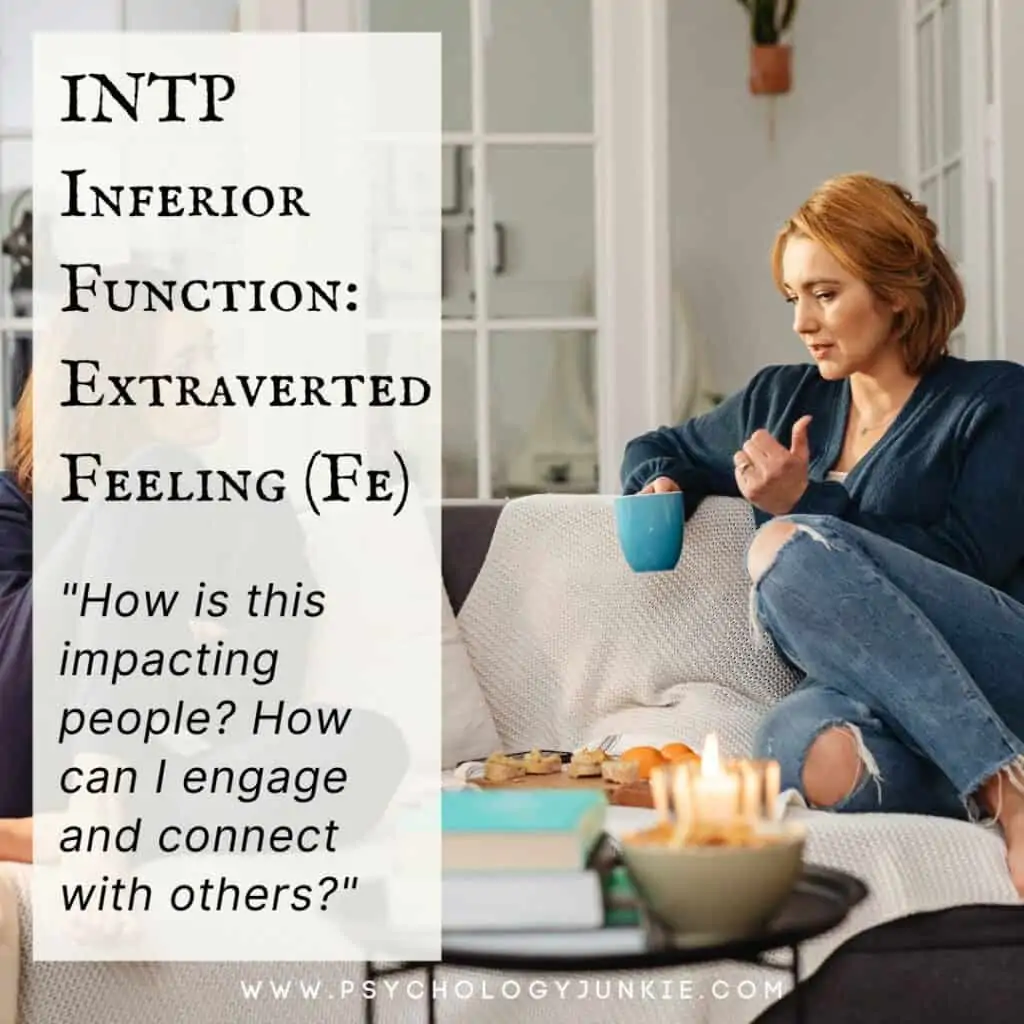
As an Inferior Function, Extroverted Feeling (Fe) gives the INTP the ability to harmonize with the group for brief periods. Yet while it can help INTPs to fit in with the group, it doesn’t have the strength to generate harmony or moods very often. Fe monitors the feeling and “vibe” of the room. INTPs will have some awareness of this, but they will naturally prioritize what’s occurring in their own minds to what’s going on around them. They often take a scientific approach to their relationships, analyzing what the other person says and pinpointing where their worldview fits based upon their assumptions.
INTPs are more likely (and more proficiently able) to engage the group with Fe through the use of Extroverted Intuition (Ne). Telling absurd, off-the-wall jokes in order to cause an amused reaction from others is an example of how an INTP can ultimately contribute to the mood of the room in a more comfortable way rather than directly trying to engage people directly through social niceties. Directly engaging the group just to shift the mood isn’t something INTPs often feel comfortable or competent doing, nor can they manage doing it for an extended period of time without feeling exhausted. INTPs might run the other way if you ask them to play host to a party as it would put too much pressure on their Feeling process. Instead, they honor their ability to be autonomous and have a hard time trying to consistently meet the needs of others around them, especially emotional and sensorial needs.
INTPs often do not feel comfortable or confident managing people or social situations (though they are great at managing themselves). However, if there is a shared interest between the INTP and others—say, the topic of Typology, for example—the INTP is more than willing to offer opinions and enter the discussion. It’s when there is no mutual intellectual interest that INTPs often feel at a loss with others.
What do you say to someone who has no common interests with you? If I talk about Stoicism, Anarchy, or the multiverse, will they know what I mean or shut me down? Will they be angry if I tell them the truth? Will they hate me if I point out what they’re missing? Should I even try to speak or should I just stay silent?
It’s not uncommon for INTPs to avoid people who they do not connect with intellectually. The workplace makes this a bit difficult as we are all forced to be around a wide range of people and personalities, but INTPs will not go out of their way to meet up with people when they are off the clock unless a sense of kinship over something significant exists between the two individuals.
INTPs tend to privilege their ability to break concepts down with Introverted Thinking (Ti) rather than build up a social group with morale (Fe). It’s important to note that neither Ti or Fe is “better” than the other. INTPs might feel worried about how they approach others, given we live in an extroverted society and life might prove easier if they could function like an ESFJ or ENFJ, but that’s not who they are. There’s nothing wrong with having strengths and insecurities. We all have them. It might be a relief to know every type wishes their weaker strength functions were stronger than they are.
The INTPs Shadow Functions
Opposing Role Function: Extroverted Thinking (Te)
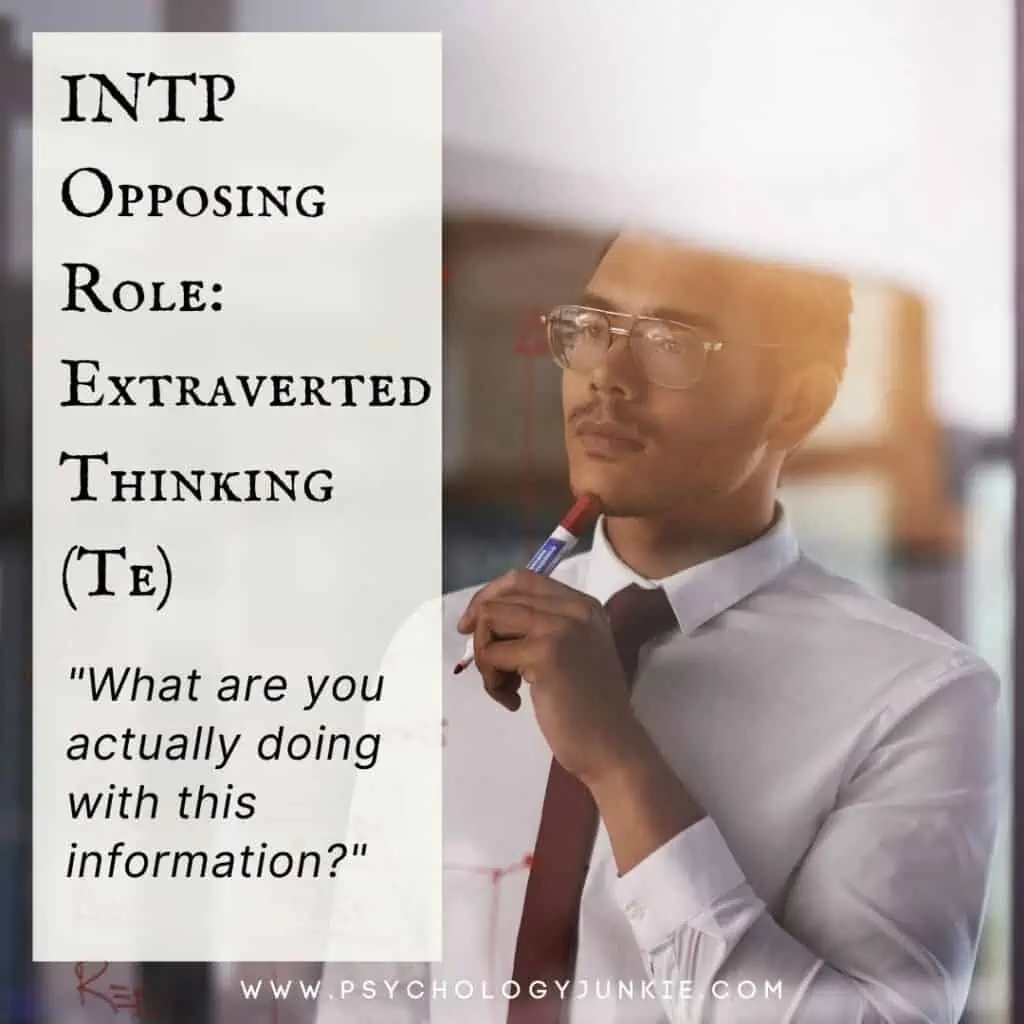
As the Opposing Role Function, Extroverted Thinking (Te) reminds INTPs that their Introverted Thinking (Ti) ponderings will be useless if they don’t do something with them in reality. Te cares about efficiency and tangible results. While Ti attempts to break down information to its purest mechanisms, Te just wants things to actually work.
The Opposing Role Function is also called the “Antagonist” function or “Nemesis” function because it contends with the Dominant function’s general disposition. INTPs tend to want more time to process the large range of information they’ve taken in with Ne before they make a move. They think that finding the total truth of a situation will protect them from poor external outcomes. Te argues, however, that the truth will not be found if the INTP doesn’t “test” the truth by applying it to the real world. While Ti runs its thought experiments, Te tests and retests ideas out in the world, looking for what ultimately is feasible. Te privileges things such as concrete applicability, effectiveness, real-world application, statistics, and so on. The back and forth between an INTP’s wish to ruminate further and Te’s voice telling them to test their thoughts in reality stimulate great annoyance and discomfort in the INTP.
As an antithesis to Ti, Te asks Ti to move beyond the conceptual and into the literal. What’s the point of endless thought experiments if they are never utilized? If INTPs heed the warnings of Te rather than disregard them for excessive rumination, INTPs may find themselves pleasantly surprised when their thoughts do apply to the real world and progress collective thought further than they once considered imaginable.
Critical Parent Function: Introverted Intuition (Ni)
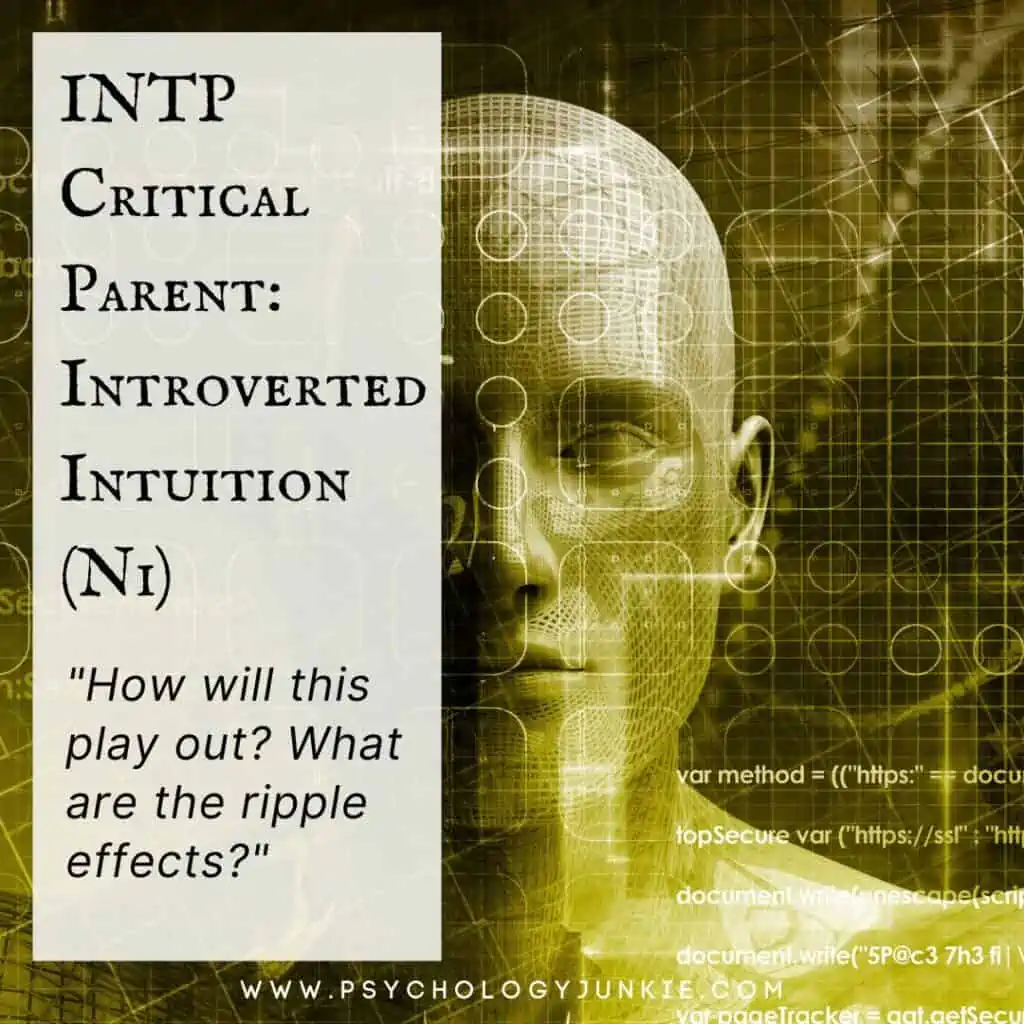
As a Critical Parent Function, Introverted Intuition (Ni) reminds the INTP to consider the long-range effects of their current endeavors. Ni may chastise the INTP for their seeming distractibility with external ideas that keep them from moving forward onto the next stage of life. Ni is a welling up of knowing that comes from within. It distills future outcomes down to the most likely, and preferred, possibility. With it comes a belief in a singularity of vision. INTPs, however, most naturally utilize Extroverted Intuition (Ne) which pushes them to consider multiple options without trying to.
Ni asks INTPs to consider the direction they are going so they do not become forever lost in the newest, shiny thought that will distract them from their ultimate cause. In Alice in Wonderland, Alice wishes to return home, but she has no clear idea of how to leave Wonderland. All of the signs Alice finds are confusing, but she utilizes her curiosity to move herself forward to see what will happen in this new, interesting place. Alice “wants” to find her way back home, but is pulled into several side quests which keep her from the ultimate goal of returning home. An INTP’s ability to endlessly brainstorm with Ne without moving a step forwards in reality looks something like Alice’s predicament: it doesn’t really matter if you have a goal in mind if you only have a vague sense of how to get there and a high propensity for distraction that moves the goal further and further down the road. Ni warns the INTP that if they keep hopping between different possibilities without settling into the importance of their direction, they’ll never get anywhere.
As a Critical Parent, Ni functions to remind the INTP that they need an end goal. Ruminations, contemplation, and possibilities are welcome if they ultimately serve moving the INTP towards the specific future they choose for themselves, but these methods can be misapplied. It would make sense for an INTP, for example, to spend ample time studying a wide range of historic information if they hope to become a Professor of History or work at a museum one day. However, putting that same amount of effort into pursuing historic information when the INTP’s goal is to become a chemist probably won’t be of much help.
Einstein is a great example of an INTP who listened to his Ni. Einstein had a day job he wasn’t fond of, but utilized his time off of work to study his passion—science—so that he could ultimately use it in the way he wanted to. It’s no secret that he became a renowned figure because of these efforts. Utilizing Einstein as an example of how to nourish productive contemplations might be a helpful way to listen and appease the Ni Critical Parent. Incremental effort towards a solid goal will lead to results—something the Opposing Role Function Extroverted Thinking (Te) would like as well.
Trickster Function: Extroverted Sensing (Se)
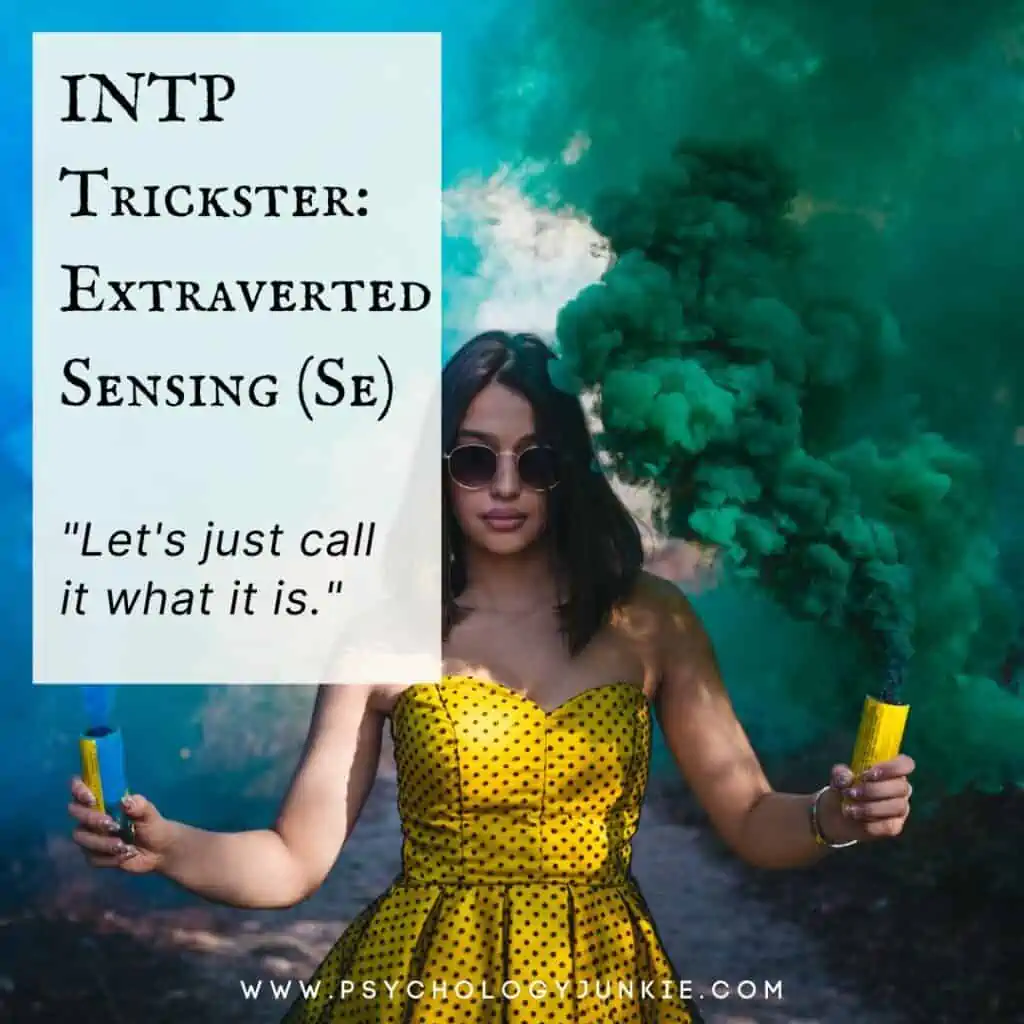
As a Trickster Function, Extroverted Sensing (Se) reminds the INTP that contemplation and theories can only take a person so far. Se tries to convince the INTP that their inability to witness reality as it is, is actually harmful. Se deals with the present, physical reality and the competent manipulation of physical objects within it. While ESTPs and ESFPs have great skill in being present so as to immerse themselves in tasks that involve a hands-on competence, INTPs tend to struggle in this area. The Trickster function often serves as a humbling awareness that no person can be all things to all people.
The Trickster (Se) is supposedly activated when Tertiary Introverted Sensing (Si) is being acted upon in a negative way. For the INTP, this might look something like another person forcing their will upon the INTP by repeatedly pressuring them to do something they do not wish to do or an INTP suddenly finding themselves in a crisis situation where manipulating objects is required (needing to give CPR when the INTP doesn’t know how to might be an extreme yet visual example of the stress an INTP might go through in these situations). Given that Si’s role is to give an INTP the peace of mind to zone out of reality in order to explore fully with Introverted Thinking (Ti), it would prove cognitively jarring to ruin that sense of calm and stasis that allows the INTP to explore and distill material cognitively as their nature is meant to do.
Trickster Se also reminds INTPs that they seem perpetually stuck in their heads and need to experience life for what it is. To some extent, this is true given their inclination towards taking in new information, pondering, and distilling truth from it. However, INTPs are less apt to participate in the here and now due to a general discomfort with sensory stimulus and immersion. INTPs tend to shy away from physical risks with the help of their Si. INTPs are not necessarily “poor” at sports and other hands-on activities—some might even be great at them with enough repetition—but they do struggle to stay present in the moment. This inability to stay present makes the quick movements of objects and people within fast-paced sensory situations a bit uncomfortable for the INTP. It might be easy for the INTP to shoot off onto several different intellectual topics, but multitasking with thoughts and multitasking with objects are completely different realms.
INTPs will never have the ability of ESTPs or ESFPs to actively approach the moment with their full selves, however, INTPs do have the reflective capacity of Si at their disposal. When Se is at the gates, it may prove helpful for the INTP to recognize that their tangible, real-world experience can be reflected on and broken down with Ti later even if they are experiencing discomfort in the present situation. The sensory stimulus may prove overwhelming in the moment, but may feed into Ti insights in a way that reflection on ideas alone would not reach without some real-time input.
Daemon Function: Introverted Feeling (Fi)
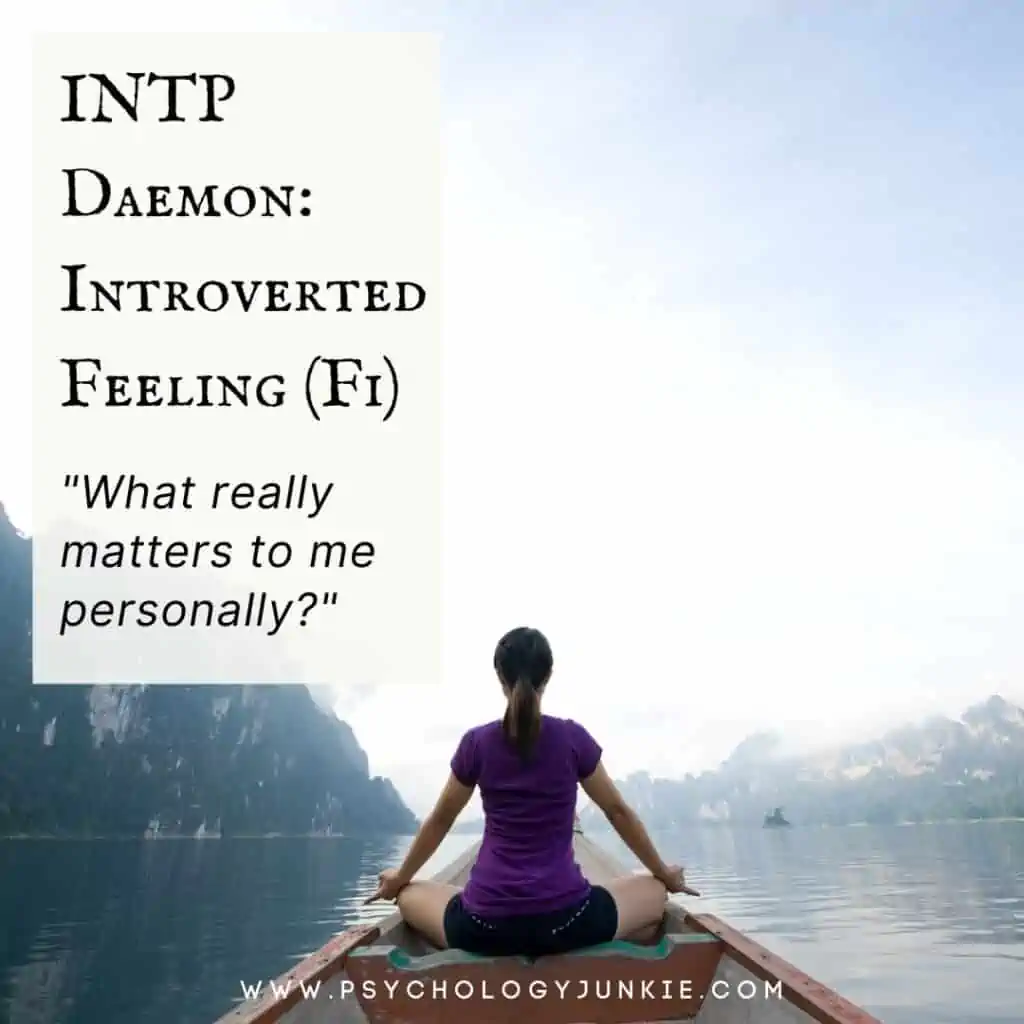
As a Daemon Function, Introverted Feeling (Fi) reminds the INTP to pause their ongoing Introverted Thinking (Ti) analysis in favor of considering their inherent personal values. It sounds well and good enough on paper, however, INTPs often feel far removed from what “matters” according to subjective, feeling-based criteria. Fi is the last rung on the INTP’s cognitive function stack. The Daemon Function is basically the “blow up your life” function because it asks the individual to prioritize the function furthest from their conscious psychology. An INTP making life choices with Fi would take them far away from their natural pursuit of subjective, logical truth (Ti). This function is basically in the basement of the INTP’s cognitive function “house.”
Daemon Fi tries to convince the INTP that their inner emotional states and positions need to have their say. Fi in itself might look something like an individual standing up for what they believe in and using moral conviction with full force, regardless of how it will make the people around them feel. Fi asks each individual where their personal hard limits are and where their personal values diverge from others. INTPs typically do not bat in this arena and can find their projection of what they believe Fi to be rather unsettling.
INTPs generally want the group to be satisfied with Extroverted Feeling (Fe) so that they can contemplate and reach truth (Ti). Fi is not exactly “in alignment” with this goal. Fi has the capacity to make people uncomfortable through social tension, which the INTP fears because they often do not have a high capacity to fix the broken interconnectedness (Fe). Given the INTP’s discomfort with using their Inferior Function, it’s no surprise that the INTP is likely in a stressed state if they happen to remain in the Fi sphere for long. An INTP utilizing Fi unconsciously might look something like self-lacerations around not being good enough or the projection of poor ethics onto others. An INTP who uses Fi without being conscious of what they are doing might fall into the pits of “nothing really matters to me” (Fi) because they are not doing what they are made to do, which is distilling insights and revelations from the discovery process (TiNe).
I am not saying that INTPs shouldn’t use Fi, but I do think there are ways to manage the Fi Daemon Function that do not end in the INTP hating existence because they have a hard time registering what, if anything, is inherently valuable when they are pushed away from their inherent insight-seeking processes. If an INTP wants to discover what is subjectively valuable and important to their own Fi, they might ask why their independent TiNe projects have proven worth their efforts. They might ask what about the process of distilling truth grants them the drive to continue ruminating and contemplating over the materials they find on their intellectual journey. Another approach might be looking at the people the INTP wishes to share harmony with (Fe) and from there, jumping to the Fi questions over how and why the bonds they participate in ultimately give their life meaning and subjectively matter.
What Are Your Thoughts?
Did you enjoy this article? Do you feel like you have a clearer grasp of the INTP’s cognitive function stack? Maybe you have thoughts or insights that you’d like to share with me or fellow readers! Let me know about your INTP experience in the comments!
Other Articles You Might Enjoy:
24 Signs That You’re an INTP, the Prodigy Personality Type
The Flirting Style of the INTP Personality Type
Resources:
Building Blocks of Personality Type by Leona Haas and Mark Hunziker (Eltanin Publishing, 2014)
Depth Typology: The Guide Map To Becoming Who We Are by Mark Hunziker (Write Way Publishing, 2016)
The INTP “Architect” Personality Type – Personality Hacker
About the Author:









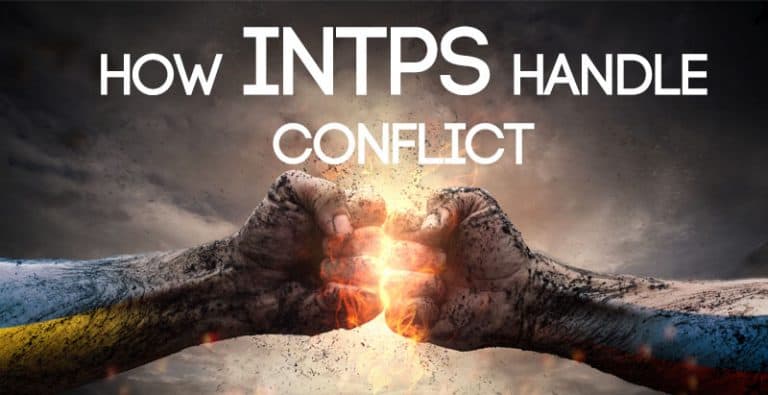


I feel seen
Expecting for more types
I thank you greatly for this, I have not understood it all yet, but this article helped me with my personal “ultimate truth”. It is also an article which isn’t a clickbait and that is rare nowadays. Again, thank you so much.
Appreciate this article. It will take several more reads to internalise, but I definitely feel ‘seen’ and better understand the internal conflict at play as an INTP. 🙏👏 Thanks for writing.
Excellent. A keeper I’ll return to many times.